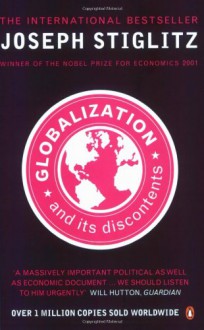
There is not all that much that sets this book apart from all of the other anti-corporate books that have been released, except that at the end the writer says that this is not so much a book to help us look for a way forward and a way to get out of this mess that we have found ourselves in, but rather as a means to vent her frustration over the ever encroaching corporate and technocratic domination of our lives. The thing is that Penny doesn't actually say anything new in this book, and does not really point out anything that we don't already know, and there are much better books out there that do just that (such as [author:Naomi Klein]'s [book:No Logo]).
The thing about the corporation is that there are two sides to every issue. Corporations are able to raise huge amounts of capital to be able to produce things that normal people like us are not able. They are also able to make life easier and to provide avenues for us to be able to get things that we like and need. Without the corporation we would not have supermarkets, or multiplex cinemas, or even the vehicle to get you to these places.
On the flip side, they have what is effectively unfettered power of control. Corporations control what we see and what we do. With the amount of money they are able to raise they are able to influence governments and elections. We have seen this recently in Australia where one media company pretty much dictated the election result by printing newspaper articles with views that they wanted people to see. For instance, opposition leader was pictured as the saviour that Australia needed while every move that the government made was plastered everywhere, and was given a negative twist (while this has been the case for a long time with elections, it has never been to this extent previously in Australia). Now, what we have is a government that is effectively secret and media shy, and bowing to corporate interests for what they believe is in the best interests of the country.
There is one thing that I have noticed that is coming out of this recent election and that is a law banning boycotts. This law is clearly aimed at promoting and protecting corporate interests and denying the citizens of Australia the right to freedom of speech. The question is how is this law going to be implemented. Am I going to be forced to eat at McDonalds, and am I going to be forced to do all of my shopping at one of the major supermarkets because if I don't it will be considered a boycott. Or is this law going to fall flat on its face because there is no way to actually determine whether a consumer's buying behaviour is a boycott or simply choice.
Another thing this book raises is the idea of the phone maze. I work in a glorified call center (meaning that we need to have decent training to be able to work where we are working) and the idea of the phone maze is to try and direct us to where we want to go. With the number of calls I make out, I encounter either the switchboard, or the phone maze. Having navigated lots of phone mazes, one becomes proficient in getting to where you want to go, or at least working out how to speak to a person because a computer simply has no intelligence and only responds to commands. Otherwise you hit the switchboard which, unless you are ultra-specific, they end up sending you to the wrong department anyway.
One thing that I notice in my workplace is how people are being forced to specialise. The work duties are slowly being narrowed down in the same way that the manufacturing sector has narrowed down the tasks that the workers perform. Before the industrial revolution, blacksmiths used to be multi-skilled, however now all you do is the same repetitive task day in and day out. The same is the case with office work, and with file management, as the specific tasks on each file are farmed out to specialists. Being somebody who likes variety in my work, and to be able to be challenged from multiple different sectors, this is something that I do not particularly like.

 Log in with Facebook
Log in with Facebook 






